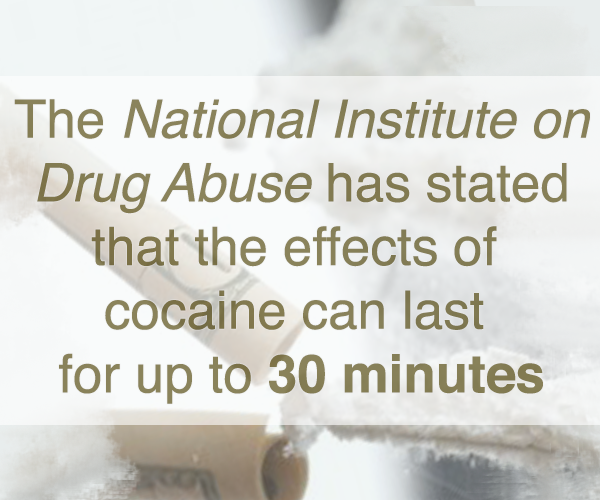
The question of how long cocaine can remain in the human body has a double meaning. On one hand, the question can easily refer to how long an individual who uses cocaine will feel the euphoric effects. On the other, it could refer to the length of time the drug is detectable in the body through drug or toxicology screening.
How Does It Affect The Brain?

Cocaine is a highly addictive stimulant that works on the dopamine levels of the human brain. According to a report published by the National Library of Medicine, cocaine causes a surplus of the brain neurotransmitter dopamine, which is responsible for the pleasure and reward system of the central nervous system. Under normal circumstances, the brain releases dopamine in response to an activity that should make us feel good, like eating, having sex or drinking water when we’re thirsty. To keep our mentality in check – to keep us from feeling too good in relationship to the circumstances – the cells in the brain are designed to pull back the excess dopamine. Cocaine blocks the part of the cells meant to absorb the excess dopamine, which then causes a surplus of the brain chemical. This is why an individual who abuses cocaine will feel excessively happy and energetic.
Cocaine also works obscurely on a secondary aspect of the brain’s pleasure and reward system. When the brain releases dopamine, it learns the behavior and memorizes the surroundings of the events that caused the release. This is a normal, learning experience of the human condition. If we receive joy and pleasure from eating bacon, for instance, we may experience a release in dopamine when we watch a bacon advertisement on television or if we even smell bacon cooking on a stove. The signals responsible for this learning process are triggered by the release of dopamine into the brain. A message is sent to the part of the brain known as the nucleus accumbens, or the NAc. This message contains all the information about what caused the joyous release of dopamine.
Learn More
In the case of cocaine abuse, the message could contain information such as:
- The fact cocaine was ingested
- Where the individual was at the time it was ingested
- Who the individual was with at the time it was ingested
- The immediate feelings of euphoria that came with “getting high”
- The car used to obtain the cocaine
- The sounds, including songs on the radio, surrounding the event
The National Institute on Drug Abuse has stated that the effects of cocaine can last for up to 30 minutes. Because of the very short lifespan of the euphoria, the individual must continually reintroduce the drug in sessions known as “binges.” Because of the repetitive activity, the brain continually sends the learning messages to the NAc, and the brain is continually overwhelmed with dopamine.
Over time, the environment in which the cocaine was experienced is indelibly printed on the individual’s brain, memories and psyche. The high may last for only a few minutes, but the effects can last for years. Simply being in the vicinity of a person, a place, or even a song on the radio can make the recovering addict crave the drug again.

How Long Does it Stay in Your System?
According to the Department of Labor, cocaine can remain in a person’s system for a period of two to 10 days. While this timeframe is large, it is also a black-and-white answer to a particularly gray question. There is no mention made by the Department of Labor as to what can determine the variation, such as weight, length, quantity of use or manner of ingestion. But that doesn’t really matter in the grand scheme of the practical – or impractical – use of cocaine.
Practically speaking, the effects of cocaine can cost much more than improperly behaving dopamine or other brain chemicals. Cocaine addiction can cost in terms of personal relationships, job or school performance, and long-term poor health. The greatest, and most practical, effect of cocaine use is the undeniable risk of overdose and subsequent death. If an individual obtains a “bad” dose of cocaine, or if the binge is too great or lengthy, it will not matter how many days the metabolized drugs stay in the human body.
There is help available for those who find themselves addicted to cocaine. The professionals at Axis understand how addiction works, and how to treat this terrible disease in an effective, compassionate and judgment-free environment that can help you break free of the terrible cycle of drug abuse. Call us today for more information.


